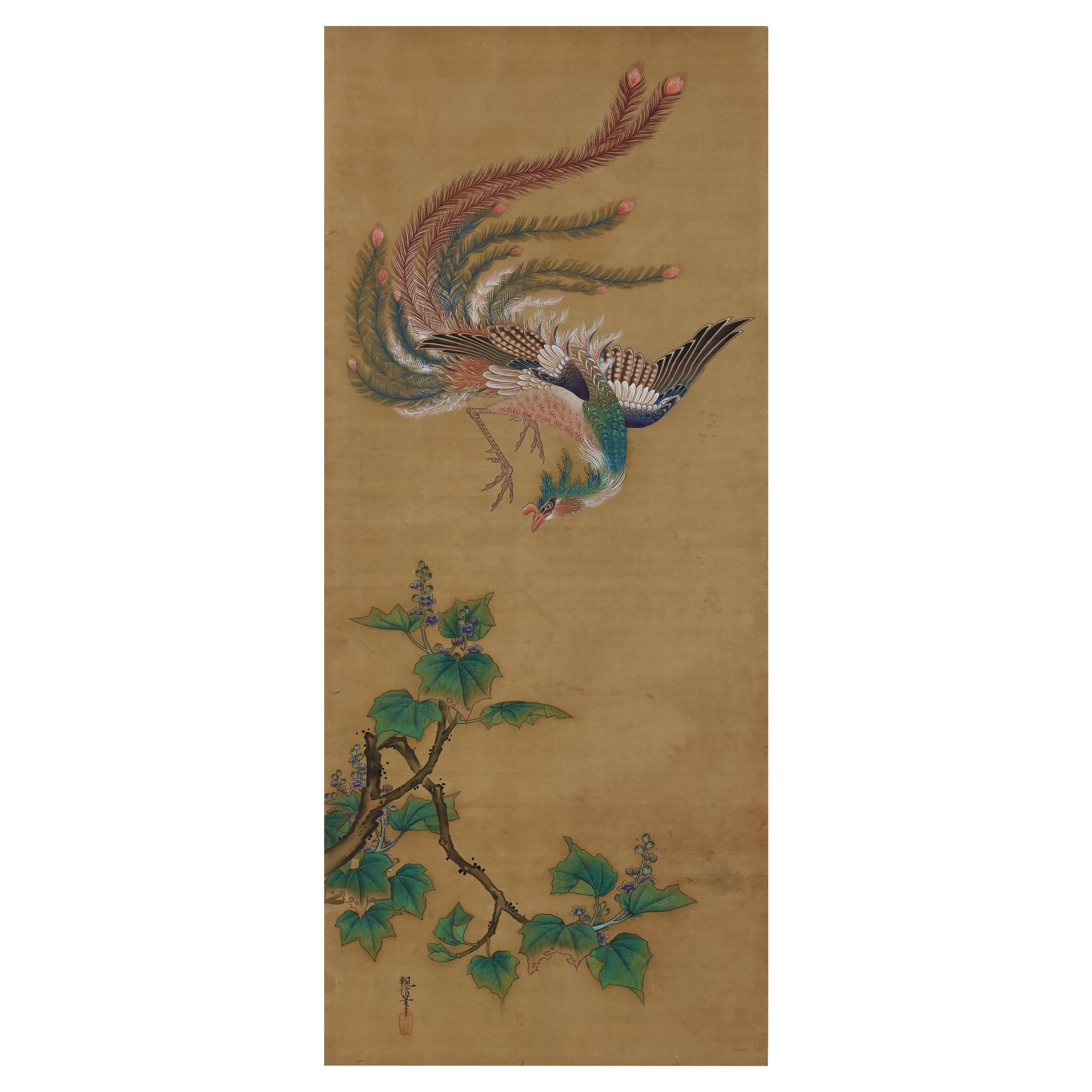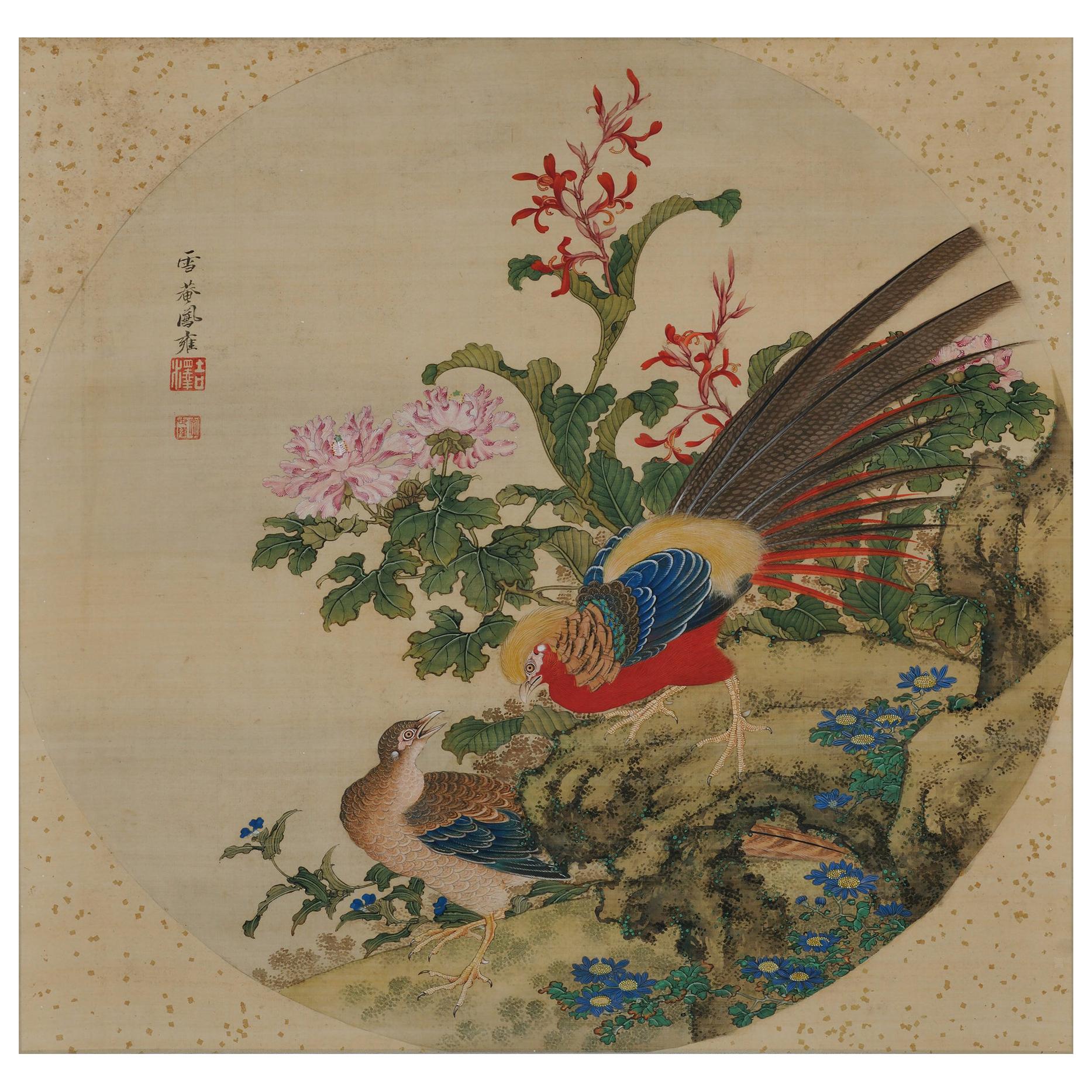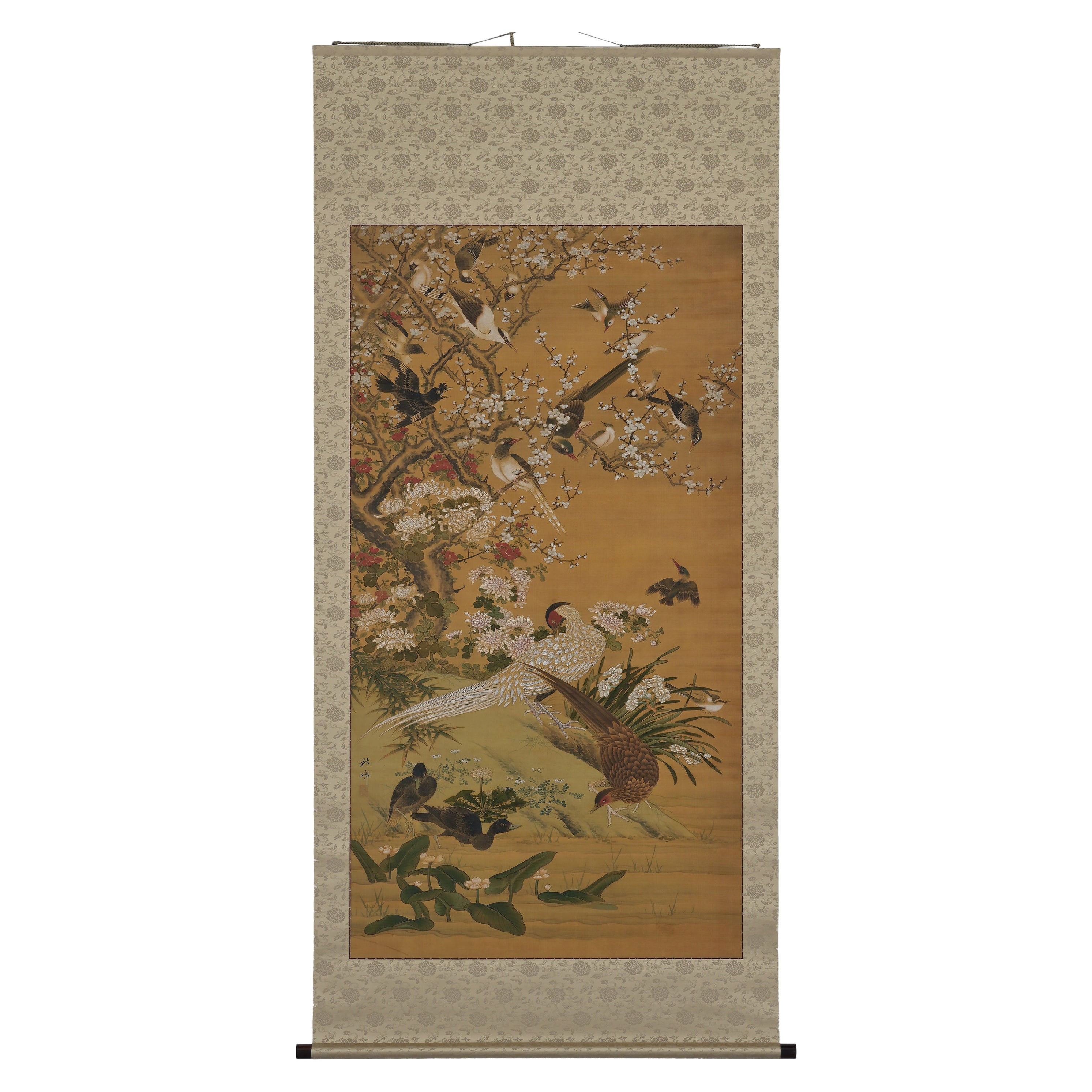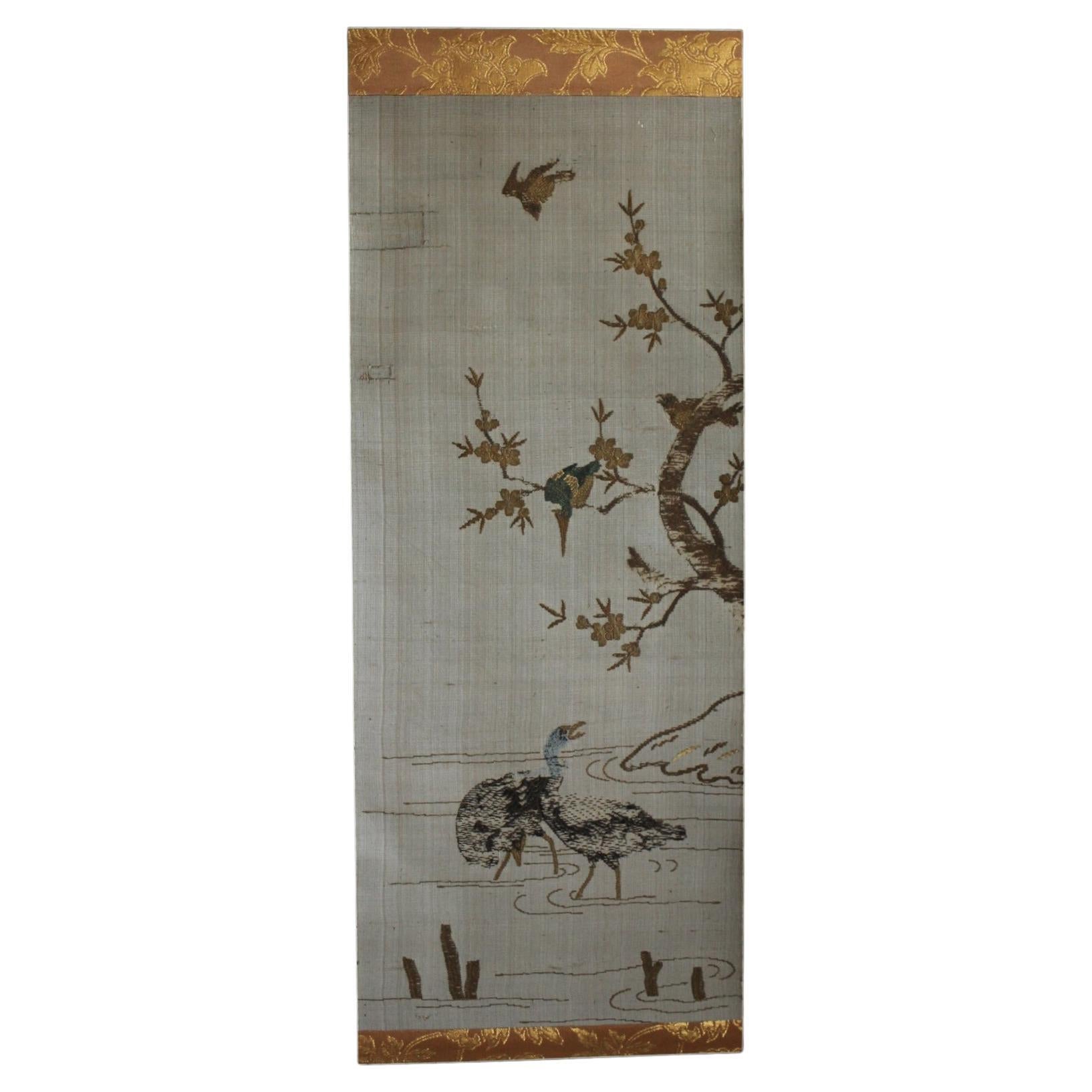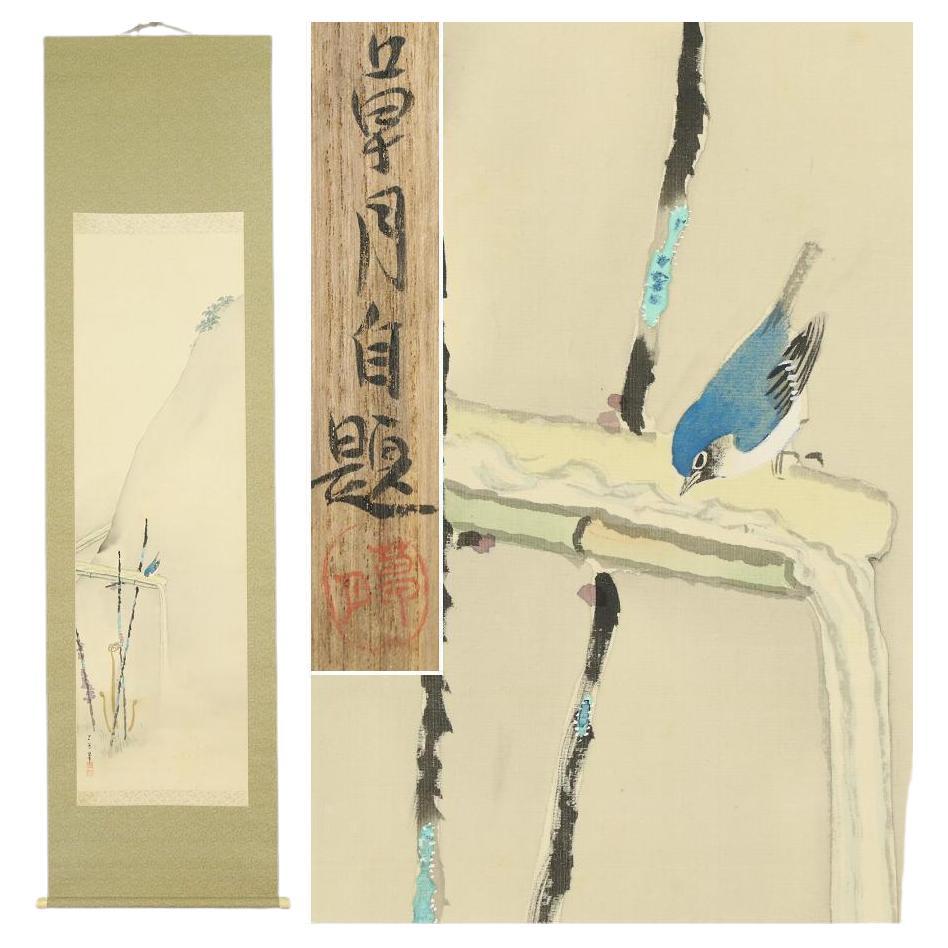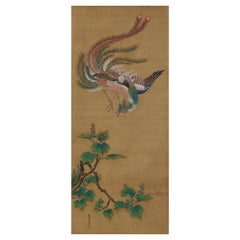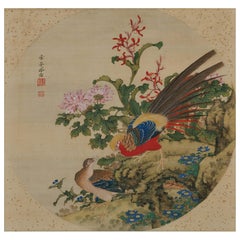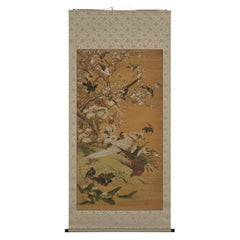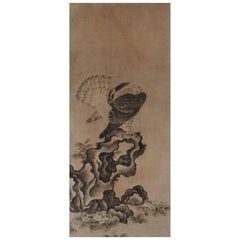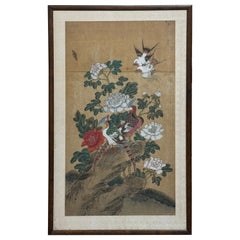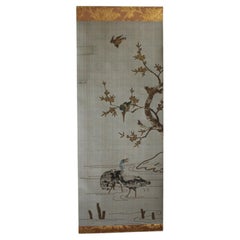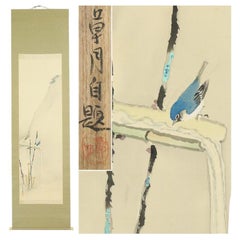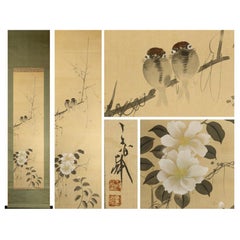Items Similar to Japanese Painting. Bird and Flower. 19th century copy of Lu Ji by Ogata Tomin.
Want more images or videos?
Request additional images or videos from the seller
1 of 6
Japanese Painting. Bird and Flower. 19th century copy of Lu Ji by Ogata Tomin.
$7,500
£5,734.15
€6,604.58
CA$10,509.80
A$11,733.20
CHF 6,148.02
MX$143,625.92
NOK 78,079.94
SEK 73,619.47
DKK 49,290.67
Shipping
Retrieving quote...The 1stDibs Promise:
Authenticity Guarantee,
Money-Back Guarantee,
24-Hour Cancellation
About the Item
Ogata Tomin (1839 -1895)
Birds in a spring landscape
Ink and colour on silk.
Inscription reads:
“Copy of Lu Ji, painted with heartfelt appreciation”
“Painted by Tomin Ogata Yosei”
Seal: Yosei
Dimensions:
H. 45” x 22” (114 cm x 55 cm)
This is an important example of a Japanese artist directly copying a painting by the Chinese master Lu Ji.
The original Lu Ji painting (see images) is part of the famed Kuroda family treasures. The Kuroda family was a powerful samurai clan based in Fukuoka, Kyushu. The artist, OgataTomin would have been able to access this painting through his position in the Ogata school. Ogata school artists were in official service to the Fukuoka Domain and Ogata Tomin was the 9th hereditary head of that school. Ogata artists were also closely affiliated with the high-ranking Surugadai branch of the Kano school. Lu Ji’s bird-and-flower paintings graced not only the imperial courts of China, but also the halls of the feudal lords of Japan, where they exercised an important influence on the development of the Kano school of painting. Despite Lu Ji’s significant influence on Japanese painting, there are few such direct transmissions of his paintings, and this is a rare historical record of their appreciation in Japan.
Ogata Tomin (1839 -1895) is the first son of the painter Ogata Tanko. His given name was Moritsune and he originally studied under his grandfather Ogata Tosho. His grandfather took him to Edo (modern Tokyo) where he studied at the Surugadai Kano school. In 1866 he became the 9th generational head of the Ogata school, although the Meiji restoration of 1867 brought about the dissolution of the school soon thereafter. Lu Jì (c. 1429–c. 1505) was a court academy painter of China of the early Ming dynasty (1368–1644).
The painting is presently unmounted. It has been restored and prepared for mounting into a Western style frame.
- Dimensions:Height: 45 in (114.3 cm)Width: 22 in (55.88 cm)Depth: 0.1 in (2.54 mm)
- Style:Ming (In the Style Of)
- Materials and Techniques:
- Place of Origin:
- Period:
- Date of Manufacture:circa 1870
- Condition:Repaired: The painting is presently unmnounted. It is ready to be inserted into a Western style frame. It has recently been restored in Kyoto utilizing traditional craftsmen and techniques. Wear consistent with age and use. The painting is presently unmounted. It has been restored and prepared for mounting into a Western style frame.
- Seller Location:Kyoto, JP
- Reference Number:1stDibs: LU2472318977082
About the Seller
5.0
Recognized Seller
These prestigious sellers are industry leaders and represent the highest echelon for item quality and design.
Established in 2001
1stDibs seller since 2016
70 sales on 1stDibs
Typical response time: 6 hours
- ShippingRetrieving quote...Shipping from: Kyoto, Japan
- Return Policy
Authenticity Guarantee
In the unlikely event there’s an issue with an item’s authenticity, contact us within 1 year for a full refund. DetailsMoney-Back Guarantee
If your item is not as described, is damaged in transit, or does not arrive, contact us within 7 days for a full refund. Details24-Hour Cancellation
You have a 24-hour grace period in which to reconsider your purchase, with no questions asked.Vetted Professional Sellers
Our world-class sellers must adhere to strict standards for service and quality, maintaining the integrity of our listings.Price-Match Guarantee
If you find that a seller listed the same item for a lower price elsewhere, we’ll match it.Trusted Global Delivery
Our best-in-class carrier network provides specialized shipping options worldwide, including custom delivery.More From This Seller
View All19th Century Japanese Silk Painting by Kano Chikanobu, Phoenix & Paulownia
Located in Kyoto, JP
Birds & Flowers of the seasons
Pheasants & Plum in Snow
Unframed painting. Ink, pigment and gofun on silk
Kano Chikanobu 1819-1888
Signature...
Category
Antique Mid-19th Century Asian Edo Paintings and Screens
Materials
Silk
Japanese Scroll Painting, 19th Century Chinese Pheasants by Yoshizawa Setsuan
Located in Kyoto, JP
Chinese Pheasants
Yoshizawa Setsuan (1809-1889)
Hanging scroll, ink and color on silk.
Painting inscription: Setsuan Houyou
Upper seal: Y...
Category
Antique Mid-19th Century Asian Meiji Paintings and Screens
Materials
Silk
19th Century Japanese Scroll Painting, Birds & Flowers of the Four Seasons
Located in Kyoto, JP
Birds and flowers of the four seasons
Early to mid-19th century
Ink, pigment and gofun on silk
Unidentified artist
Signature: S...
Category
Antique 1830s Japanese Edo Paintings and Screens
Materials
Silk
Japanese Painting, Framed Panel, 17th Century Falcon by Mitani Toshuku
By Mitani Toshuku
Located in Kyoto, JP
Mitani Toshuku (1577-1654)
“Falcon”
Wall panel, ink and light color on paper.
Upper seal: Mitani
Lower seal: Toshuku
Dimensions:
Each 118.5 cm x 51 cm x 2 cm (46.5” x 20” x .75”)
Individual falcon paintings by Mitani Toshuku (1577-1654), an early artist of the Unkoku School. Founded by Unkoku Togan (1547–1618), a master of the Momoyama period, the Unkoku school enjoyed long lasting patronage in southern Japan. Togan was a retainer of the Mori family in present day Yamaguchi prefecture. Members of the school considered themselves to be in the artistic lineage of Sesshu Toyo...
Category
Antique Early 17th Century Japanese Edo Paintings and Screens
Materials
Wood, Paper
Early 19th Century Japanese Screen. Cherry Blossom & Pheasants by Mori Tetsuzan
Located in Kyoto, JP
Mori Tetsuzan (1775-1841)
Pheasants and Cherry Blossoms
Two-fold Japanese screen. Ink, color, gofun, gold and silver on paper.
A two-fold Japanese bir...
Category
Antique Early 19th Century Japanese Edo Paintings and Screens
Materials
Gold Leaf
19th Century Japanese Silk Painting by Kano Chikanobu, Turtles & Azalea
Located in Kyoto, JP
Birds & flowers of the seasons
Pheasants & plum in snow
Unframed painting. Ink, pigment and gofun on silk
Kano Chikanobu 1819-1888
Signature...
Category
Antique Mid-19th Century Asian Edo Paintings and Screens
Materials
Silk
You May Also Like
Chinese "Birds and Peony" Ink and Color on Silk Painting, Qing Dynasty, China
Located in Austin, TX
A charming Chinese "Birds and Peony" painting, ink and color on silk, framed and glazed, Qing Dynasty, late 19th century, China.
The delightful and colorful painting features a scen...
Category
Antique Late 19th Century Chinese Qing Paintings and Screens
Materials
Metal
Japanese Antiques Takeya-machi embroidery, bird picture, hanging scroll
Located in Niiza, JP
Embroidery, scroll tip: wood
Embroidery Size: 320 (W) x 760 (H) [mm],
Overall: 470 (W) x 1650 (H) [mm]
Box size: 80×70×630㎜ 800g
Takeya-machi embroidery has a long history.
When T...
Category
Antique Early 19th Century Japanese Textiles
Materials
Paper
Japanese Painting Showa Scroll Nihonga Kobayashi Sogetsu - Bird and FLowers
Located in Amsterdam, Noord Holland
[Authentic work] ◆ Kobayashi Sogetsu ◆ Spring scene ◆ Flowers and birds ◆ Gunma prefecture ◆ Hand-painted ◆ Silk◆ Hanging scroll ◆
Kobayashi Sogetsu
[Art yearbook appraised value 75...
Category
Vintage 1930s Taisho Paintings
Materials
Silk
$2,077 Sale Price
20% Off
Artists Kashiro Ashimi Meiji Period Bird Scroll Japan 20c Artist Nihonga
Located in Amsterdam, Noord Holland
As you can see, Kashiro Asami brush flower and bird (sparrow) figure Axle.
In addition to the flowers expressed in simple yet calm shades, the
bird (sparrow) seen at the top is a w...
Category
20th Century Japanese Showa Paintings and Screens
Materials
Silk
$737 Sale Price
20% Off
Lovely 19th Century Scroll Paintings Japan Artist Signed Crane in Landscape
Located in Amsterdam, Noord Holland
Artist: Tatematsu kiseki
Born in the forest home of Nagoya gun-cho, it inherits the later Tatematsu house.
Learn to Okumura Ishiran. Later the director of Seiho meeting was studied with Kono Bairei-Seiho Takeuchi...
Category
Antique 19th Century Japanese Meiji Paintings and Screens
Materials
Fabric
$1,086 Sale Price
20% Off
Japanese Two Panel Screen Manchurian Crane and Turtles
Located in Hudson, NY
In Japan, cranes symbolize fidelity as they mate for life and turtles symbolize longevity. Additionally, this screen also has the Japanese motif of sho-chiku-bai, or the three friends of winter (pine, plum, and bamboo). So called the three friends of winter because all three flourish during the cold months. This screen was originally fusuma doors...
Category
Antique Mid-19th Century Japanese Edo Paintings and Screens
Materials
Paper
More Ways To Browse
Flower Paintings
Bird Silk Art
Asian Bird Paintings
Chinese Bird Painting
Asian Silk Art Birds
19th Century Chinese School
Chinese Bird And Flowers Painting
Japanese Silk Painting Ink
Antique Chinese Painting Of Birds
Framed Silk Art Birds
Chinese Screen With Birds
Kano School
Japanese Silk Art Landscape
Bird Paintings On Silk
Chinese Ink On Silk
Ming Dynasty Painting
Japanese Silk Screen Flowers
Chinese Court Paintings

